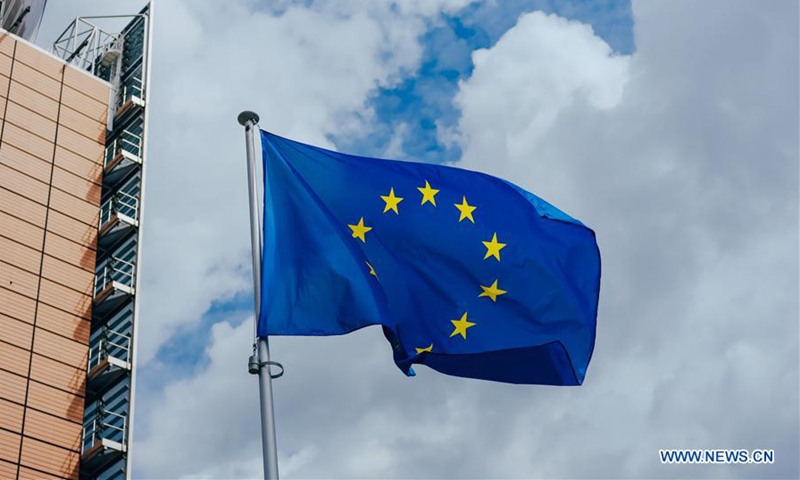Talks with EU make positive progress in reaching BIT: MOFCOM
Source: Global Times Published: 2020/12/14 21:03:40

A European Union flag is seen in front of the European Commission headquarters in Brussels, Belgium, July 7, 2020. Photo: Xinhua
China and the EU made positive progress in the latest round of negotiations for reaching a bilateral investment treaty (BIT) last week, China's Ministry of Commerce (MOFCOM) said on Monday.
During the 35th round of talks held from December 6-11, the two sides focused on remaining issues about the text and lists, according to the ministry.
Chinese officials have reiterated the nation's hope to conclude the negotiations within this year. The BIT talks are among China's most important trade and economic negotiations, and the negotiations started in 2013.
It is a common aspiration for China and the EU to clinch the deal at an early date, and China is willing to take into full consideration of each other's concerns and strive to complete the negotiations within 2020, Gao Feng, a spokesperson for the MOFCOM, said.
Pan Yuanyuan, an associate researcher at the Institute of World Economics and Politics of the Chinese Academy of Social Sciences, told the Global Times on Monday that there might be some fierce arguments now within the EU countries about the BIT.
"Unlike trade pacts, deals on investment actually have no clear-cut standards. Besides, there are many countries in the trading bloc that have various investment review criteria, so it takes time," said Pan.
In November, German Chancellor Angela Merkel congratulated China on signing the Regional Comprehensive Economic Partnership with 14 other Asia-Pacific countries and said she hoped to "put in more effort" to conclude the investment deal between the EU and China, the Xinhua News Agency reported.
"China is prepared for some changes from the EU, but no matter how many differences or frictions occur, we hope that trade, investment agreements and other existing cooperation won't be affected," said Cui Hongjian, director of the Department of European Studies at the China Institute of International Studies.
"If the treaty can be signed in this year as expected, there will also be follow-up discussions on details," Pan noted, adding that the treaty is an important opportunity that EU cannot miss out on, especially in the post COVID-19 recovery.
Compared with investment involving other developed economies, Chinese investment in the EU has displayed an overall uptrend, with France and Germany being the top destinations, according to Pan.
Last year, Chinese investment in Europe declined 40 percent and in North America fell 27 percent to a total of $19 billion, the lowest since 2010 and 83 percent down from the 2017 peak of $107 billion. Europe received more than twice the amount of investment ($13.4 billion) as North America ($5.5 billion), according to a survey released by multinational law firm Baker McKenzie.
Posted in: ECONOMY